译林版(2019)必修第三册Unit 2 Natural disasters Grammar and usage 课件(共17张PPT)
文档属性
| 名称 | 译林版(2019)必修第三册Unit 2 Natural disasters Grammar and usage 课件(共17张PPT) |
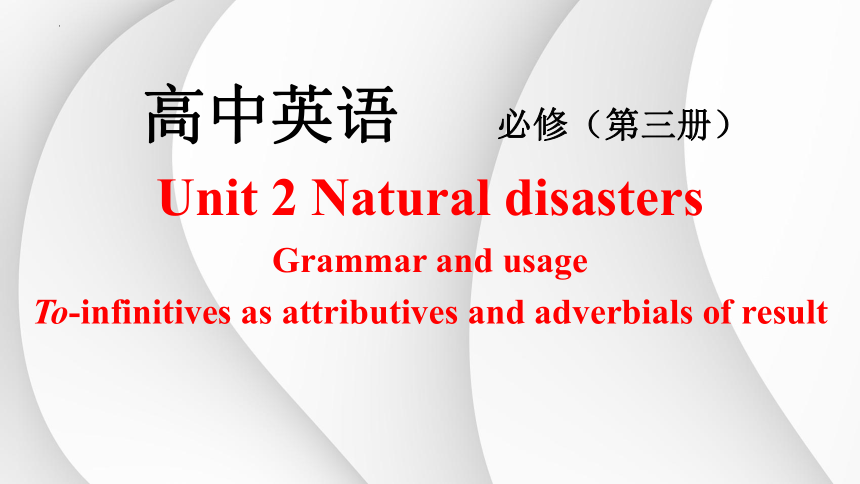
|
|
| 格式 | pptx | ||
| 文件大小 | 258.8KB | ||
| 资源类型 | 教案 | ||
| 版本资源 | 牛津译林版(2019) | ||
| 科目 | 英语 | ||
| 更新时间 | 2024-02-29 00:00:00 | ||
图片预览

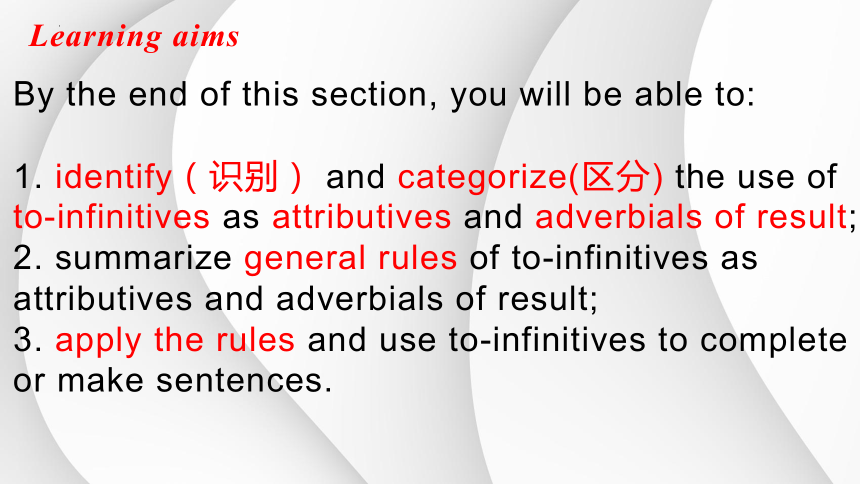
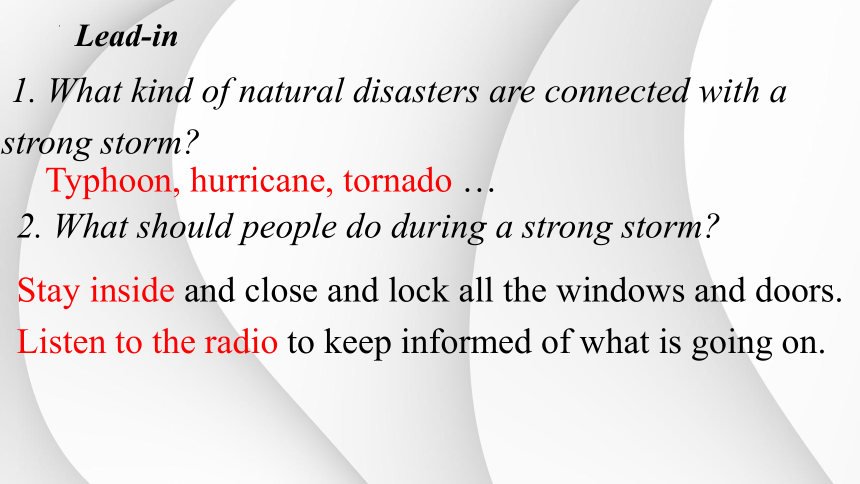
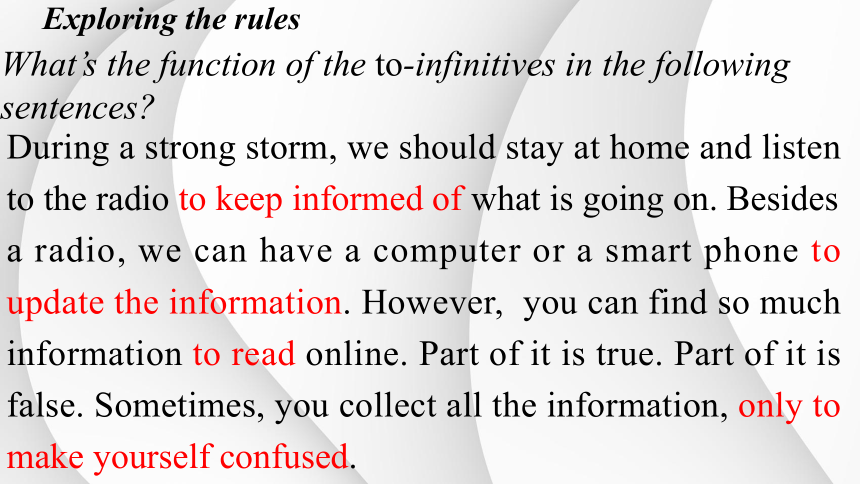
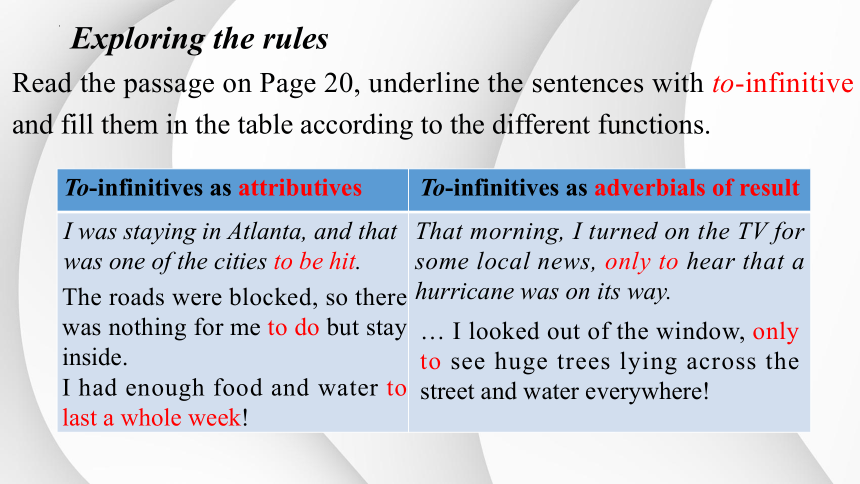
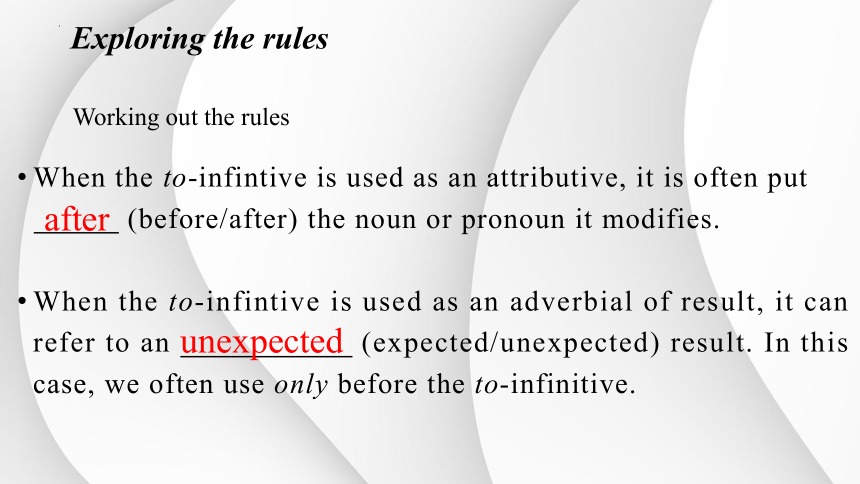
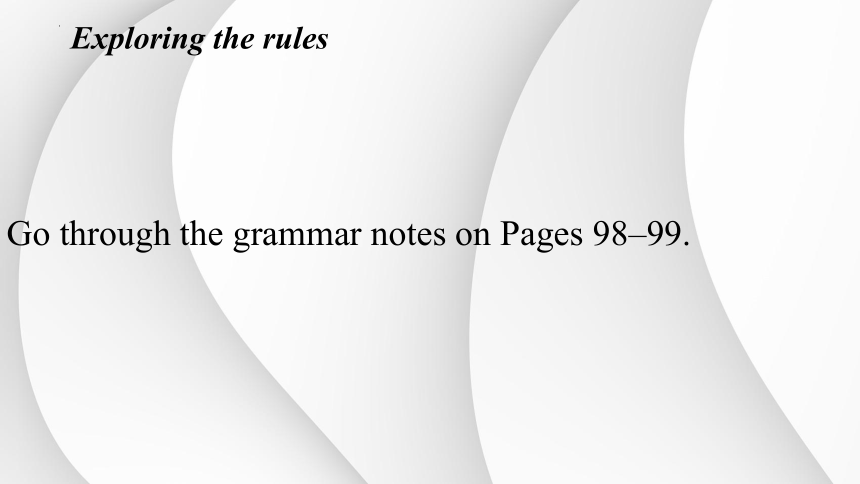
文档简介
(共17张PPT)
Unit 2 Natural disasters
Grammar and usage
To-infinitives as attributives and adverbials of result
高中英语 必修(第三册)
By the end of this section, you will be able to:
1. identify(识别) and categorize(区分) the use of to-infinitives as attributives and adverbials of result;
2. summarize general rules of to-infinitives as attributives and adverbials of result;
3. apply the rules and use to-infinitives to complete or make sentences.
Learning aims
1. What kind of natural disasters are connected with a strong storm
Lead-in
Typhoon, hurricane, tornado …
2. What should people do during a strong storm
Stay inside and close and lock all the windows and doors.
Listen to the radio to keep informed of what is going on.
During a strong storm, we should stay at home and listen to the radio to keep informed of what is going on. Besides a radio, we can have a computer or a smart phone to update the information. However, you can find so much information to read online. Part of it is true. Part of it is false. Sometimes, you collect all the information, only to make yourself confused.
What’s the function of the to-infinitives in the following sentences
Exploring the rules
Read the passage on Page 20, underline the sentences with to-infinitive and fill them in the table according to the different functions.
To-infinitives as attributives To-infinitives as adverbials of result
I was staying in Atlanta, and that was one of the cities to be hit. That morning, I turned on the TV for some local news, only to hear that a hurricane was on its way.
The roads were blocked, so there was nothing for me to do but stay inside.
I had enough food and water to last a whole week!
… I looked out of the window, only to see huge trees lying across the street and water everywhere!
Exploring the rules
When the to-infintive is used as an attributive, it is often put
(before/after) the noun or pronoun it modifies.
When the to-infintive is used as an adverbial of result, it can refer to an (expected/unexpected) result. In this case, we often use only before the to-infinitive.
after
unexpected
Working out the rules
Exploring the rules
Go through the grammar notes on Pages 98–99.
Exploring the rules
Applying the rules
Match the first half of the sentences below with the correct to-infinitives.
B1
(1) e
(2) c
(3) d
(4) b
(5) a
Applying the rules
Complete the diary entry below using to-infinitives.
B2
(1) to find books about hurricanes
(2) to find he was not in the office
(3) to attend
(4) to make PPT slides for my project
Work in pairs and complete the conversation using to-infinitives.
B3
(1) was actually the first to leave
(2) to keep us warm
(3) wanted to return home as soon as possible
(4) to find it completely destroyed
(5) advised us to take an active part in the rebuilding
Applying the rules
Other functions of to-infinitives besides attributives and adverbials of result
Subject:
Object:
Object completement:
Predicative:
Other special funcions:
(1) To keep smiling is healthy for you.
(2) It’s important to learn English well.
We all hope to learn English well.
(1) Our Enlish teacher wishes us to learn
English well.
(2) I saw him cross the street.(省略to)
My job is to help you (to) learn English well.
(1) I am glad to help you with your English.(原因状语)
(2) Many students ask how to learn English well.
Applying the rules
Consolidation
Translate the following sentences.
1. 少吃点油炸食品是个好主意。
2. 你需要在安静的地方学习。
3. 我告诉他不要放弃。
4. 你能给我一些可以写字的纸吗?
5. 我大声朗读来锻炼我的发音。
6. 我跑到车站,却被告知火车已经离开了。
It is a good idea to eat less fried food.(主语)
You need to study at a quiet place.(宾语)
I told him not to give up.(直接宾语)
Can you give me some paper to write on (定语)
I read loudly to practise my pronunciation.(目的状语)
I ran to the station, only to be told that the train had already left.(结果状语)
Consolidation
Choose the right verb form.
1. We must do what we can_________those who are in trouble. (help; to help )
2. I think these problems are easy___________,So you don't have to ask the teacher for help.(to work out; to be worked out)
3. Every minute should be made full use of_________ our lessons well.(to study; studying)
4. Emily stopped her car_________a black cat_________across the street. (let, to run; to let, run)
5. Paul doesn't have to be made_________.He always works hard.( learn; to learn)
to help
to work out
to study
to let
run
to learn
Consolidation
Choose the right verb form.
6. The telephone is generally considered to______________by Alexander Graham Bell.( be invented; have been invented)
7. It is careless_____________the same mistake again in your composition. ( for you to make ; of you to make )
8.—Why not_________someone_________your letter (get, to type ; to get, type )
—No one can find a typewriter around here.
9.Anxiously, she took the dress out of the package and tried it on, only_________it didn't fit.( to find; finding )
10.—I hope to take the computer course. —Good idea._________more about it, visit this website.( Find out; To find out )
have been invented
of you to make
get
to type
to find
To find out
Consolidation
Choose the right verb form.
11. He is thought_________foolishly. Now he has no one but himself to blame for losing the job.( to act; to have acted )
12.There are still many problems_________before we are ready for a long stay on the Moon.(solved; to be solved )
13.The students are looking forward to having an opportunity_________society for real-life experience.(exploring; to explore)
14.The engine just won't start. Something seems_________wrong with it. (to go; to have gone )
15. The airport_________next year will help promote tourism in this area.(completed; to be completed)
to have acted
to be solved
to explore
to have gone
to be completed
Consolidation
Choose the right verb form.
16. We're having a meeting in half an hour. The decision_________at the meeting will influence the future of our company.(to be made;made)
17. The old man sat in front of the television every evening,happy_________anything that happened to be on. ( watching; to watch)
18. Birds’ singing is sometimes a warning for other birds_________away.( staying; to stay)
19.We've had a good start, but next more work needs_________to achieve the final success.(be done; to be done)
20.This machine is very easy_________. Anybody can learn to use it in a few minutes.( to be operated; to operate)
to be made
to watch
to stay
to be done
to operate
Homework
1. Find out the sentences with to-infinitive on Pages 16–17 and understand the functions.
2. Finish the workbook.
Unit 2 Natural disasters
Grammar and usage
To-infinitives as attributives and adverbials of result
高中英语 必修(第三册)
By the end of this section, you will be able to:
1. identify(识别) and categorize(区分) the use of to-infinitives as attributives and adverbials of result;
2. summarize general rules of to-infinitives as attributives and adverbials of result;
3. apply the rules and use to-infinitives to complete or make sentences.
Learning aims
1. What kind of natural disasters are connected with a strong storm
Lead-in
Typhoon, hurricane, tornado …
2. What should people do during a strong storm
Stay inside and close and lock all the windows and doors.
Listen to the radio to keep informed of what is going on.
During a strong storm, we should stay at home and listen to the radio to keep informed of what is going on. Besides a radio, we can have a computer or a smart phone to update the information. However, you can find so much information to read online. Part of it is true. Part of it is false. Sometimes, you collect all the information, only to make yourself confused.
What’s the function of the to-infinitives in the following sentences
Exploring the rules
Read the passage on Page 20, underline the sentences with to-infinitive and fill them in the table according to the different functions.
To-infinitives as attributives To-infinitives as adverbials of result
I was staying in Atlanta, and that was one of the cities to be hit. That morning, I turned on the TV for some local news, only to hear that a hurricane was on its way.
The roads were blocked, so there was nothing for me to do but stay inside.
I had enough food and water to last a whole week!
… I looked out of the window, only to see huge trees lying across the street and water everywhere!
Exploring the rules
When the to-infintive is used as an attributive, it is often put
(before/after) the noun or pronoun it modifies.
When the to-infintive is used as an adverbial of result, it can refer to an (expected/unexpected) result. In this case, we often use only before the to-infinitive.
after
unexpected
Working out the rules
Exploring the rules
Go through the grammar notes on Pages 98–99.
Exploring the rules
Applying the rules
Match the first half of the sentences below with the correct to-infinitives.
B1
(1) e
(2) c
(3) d
(4) b
(5) a
Applying the rules
Complete the diary entry below using to-infinitives.
B2
(1) to find books about hurricanes
(2) to find he was not in the office
(3) to attend
(4) to make PPT slides for my project
Work in pairs and complete the conversation using to-infinitives.
B3
(1) was actually the first to leave
(2) to keep us warm
(3) wanted to return home as soon as possible
(4) to find it completely destroyed
(5) advised us to take an active part in the rebuilding
Applying the rules
Other functions of to-infinitives besides attributives and adverbials of result
Subject:
Object:
Object completement:
Predicative:
Other special funcions:
(1) To keep smiling is healthy for you.
(2) It’s important to learn English well.
We all hope to learn English well.
(1) Our Enlish teacher wishes us to learn
English well.
(2) I saw him cross the street.(省略to)
My job is to help you (to) learn English well.
(1) I am glad to help you with your English.(原因状语)
(2) Many students ask how to learn English well.
Applying the rules
Consolidation
Translate the following sentences.
1. 少吃点油炸食品是个好主意。
2. 你需要在安静的地方学习。
3. 我告诉他不要放弃。
4. 你能给我一些可以写字的纸吗?
5. 我大声朗读来锻炼我的发音。
6. 我跑到车站,却被告知火车已经离开了。
It is a good idea to eat less fried food.(主语)
You need to study at a quiet place.(宾语)
I told him not to give up.(直接宾语)
Can you give me some paper to write on (定语)
I read loudly to practise my pronunciation.(目的状语)
I ran to the station, only to be told that the train had already left.(结果状语)
Consolidation
Choose the right verb form.
1. We must do what we can_________those who are in trouble. (help; to help )
2. I think these problems are easy___________,So you don't have to ask the teacher for help.(to work out; to be worked out)
3. Every minute should be made full use of_________ our lessons well.(to study; studying)
4. Emily stopped her car_________a black cat_________across the street. (let, to run; to let, run)
5. Paul doesn't have to be made_________.He always works hard.( learn; to learn)
to help
to work out
to study
to let
run
to learn
Consolidation
Choose the right verb form.
6. The telephone is generally considered to______________by Alexander Graham Bell.( be invented; have been invented)
7. It is careless_____________the same mistake again in your composition. ( for you to make ; of you to make )
8.—Why not_________someone_________your letter (get, to type ; to get, type )
—No one can find a typewriter around here.
9.Anxiously, she took the dress out of the package and tried it on, only_________it didn't fit.( to find; finding )
10.—I hope to take the computer course. —Good idea._________more about it, visit this website.( Find out; To find out )
have been invented
of you to make
get
to type
to find
To find out
Consolidation
Choose the right verb form.
11. He is thought_________foolishly. Now he has no one but himself to blame for losing the job.( to act; to have acted )
12.There are still many problems_________before we are ready for a long stay on the Moon.(solved; to be solved )
13.The students are looking forward to having an opportunity_________society for real-life experience.(exploring; to explore)
14.The engine just won't start. Something seems_________wrong with it. (to go; to have gone )
15. The airport_________next year will help promote tourism in this area.(completed; to be completed)
to have acted
to be solved
to explore
to have gone
to be completed
Consolidation
Choose the right verb form.
16. We're having a meeting in half an hour. The decision_________at the meeting will influence the future of our company.(to be made;made)
17. The old man sat in front of the television every evening,happy_________anything that happened to be on. ( watching; to watch)
18. Birds’ singing is sometimes a warning for other birds_________away.( staying; to stay)
19.We've had a good start, but next more work needs_________to achieve the final success.(be done; to be done)
20.This machine is very easy_________. Anybody can learn to use it in a few minutes.( to be operated; to operate)
to be made
to watch
to stay
to be done
to operate
Homework
1. Find out the sentences with to-infinitive on Pages 16–17 and understand the functions.
2. Finish the workbook.
同课章节目录
- Unit 1 Nature in the balance
- Welcome to the unit
- Reading
- Grammar and usage
- Integrated skills
- Extended reading
- Project
- Unit 2 Natural disasters
- Welcome to the unit
- Reading
- Grammar and usage
- Integrated skills
- Extended reading
- Project
- Unit 3 The world online
- Welcome to the unit
- Reading
- Grammar and usage
- Integrated skills
- Extended reading
- Project
- Unit 4 Scientists who changed the world
- Welcome to the unit
- Reading
- Grammar and usage
- Integrated skills
- Extended reading
- Project
